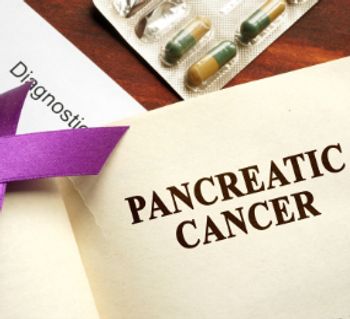
Patients with locally advanced gastric cancers saw complete response rates of 18.3% from camrelizumab and rivoceranib plus chemotherapy.

A nationally-published, award-winning journalist, Alex Biese joined the CURE team as an assistant managing editor in April 2023. Prior to that, Alex's work was published in outlets including the Chicago Sun-Times, MTV.com, USA TODAY and the Press of Atlantic City. Alex is a member of NLGJA: The Association of LGBTQ+ Journalists, and also performs at the Jersey Shore with the acoustic jam band Somewhat Relative.

Patients with locally advanced gastric cancers saw complete response rates of 18.3% from camrelizumab and rivoceranib plus chemotherapy.

From Gerry Turner announcing he has cancer to the return of a Chicago Cubs legend’s disease, here’s what’s happening in the cancer space this week.

Findings from the phase 1 SERENA-1 study were presented at the 2024 San Antonio Breast Cancer Symposium.

From a Hollywood star sharing an uplifting update to the death of a three-time boxing champion, here’s what’s happening in the cancer space this week.

With more than 150 treatments being studied in clinical trials, what is on the horizon for antibody-drug conjugates in breast cancer?

Author and kidney cancer survivor Katie Coleman explains why patients with cancer need to advocate for themselves when navigating the medical system.

The novel treatment is being evaluated for patients with previously treated transfusion-dependent lower-risk myelodysplastic syndrome.

The FDA has approved the first systemic therapy for patients with NSCLC or pancreatic adenocarcinoma with an NRG1 gene fusion.

An expert from the CURE® advisory board explains the likely treatability of Dave Coulier’s non-Hodgkin lymphoma.

The FDA has granted Breakthrough Therapy designation to sacituzumab tirumotecan for patients with advanced or metastatic nonsquamous NSCLC with EGFR mutations.

Singer-songwriter Danielia Cotton, a thyroid cancer survivor and marathon runner shared how her experiences impact her art.

Researchers have found an increased frequency of severe maternal morbidity and obstetric complications among women who received a diagnosis of a hematological malignancy during pregnancy.

Musician Danielia Cotton and her partner, attorney Sam Roberts, discuss how much they’ve shared with their daughter about their cancer journeys.

For patients with extensive-stage small cell lung cancer, Loqtorzi was shown to improve progression-free survival and overall survival.

From the deaths of actor Paul Teal and Chicago Bulls player Bob Love to a contestant on “Jeopardy!” revealing his colon cancer diagnosis, here’s what’s happening in the oncology space this week.

CURE® spoke with a lung cancer treatment expert about study findings showing survival benefits with the addition of radiotherapy to TKI treatment.

The agency has approved Ziihera for adults with previously treated, unresectable or metastatic HER2-positive biliary tract cancer.

CURE® spoke with a physical therapist specializing in oncology to find out more about this condition some patients with cancer are at risk for.

Researchers have found an overall survival benefit and manageable safety profile with Venclexta for patients with AML and MDS.

A patient with small cell lung cancer shared her clinical trial experience with CURE® and how she encourages other patients with cancer to enroll.

An expert explained how circulating tumor cell count can identify possible clinical trial participants.

From producer Quincy Jones’ death from pancreatic cancer to an inspiring moment between The Rock and a fan at a store, here’s what’s happening in the cancer space this week.

Immune checkpoint inhibitor tumor regression may indicate which patients with hepatocellular carcinoma experience improved relapse-free survival.

An expert explains how attitudes towards lymphedema risk have evolved over the years.

The actor, 65, received his diagnosis of stage 3 non-Hodgkin lymphoma in October, he said.

Three cycles of chemotherapy were found to face similar results as six cycles among children with retinoblastoma, a type of cancer of the eye.

Researchers have found an association between baseline circulating tumor cell count and survival in metastatic hormone-sensitive prostate cancer.

Rates of colorectal cancer diagnoses and deaths are climbing among patients younger than 55, researchers have shown.

The accelerated approval of Trodelvy for patients with metastatic urothelial cancer has been voluntarily withdrawn.

Expert answers to patients’ questions were offered as part of the CURE® Educated Patient® Prostate Cancer Summit.